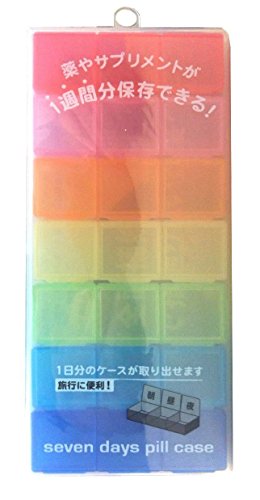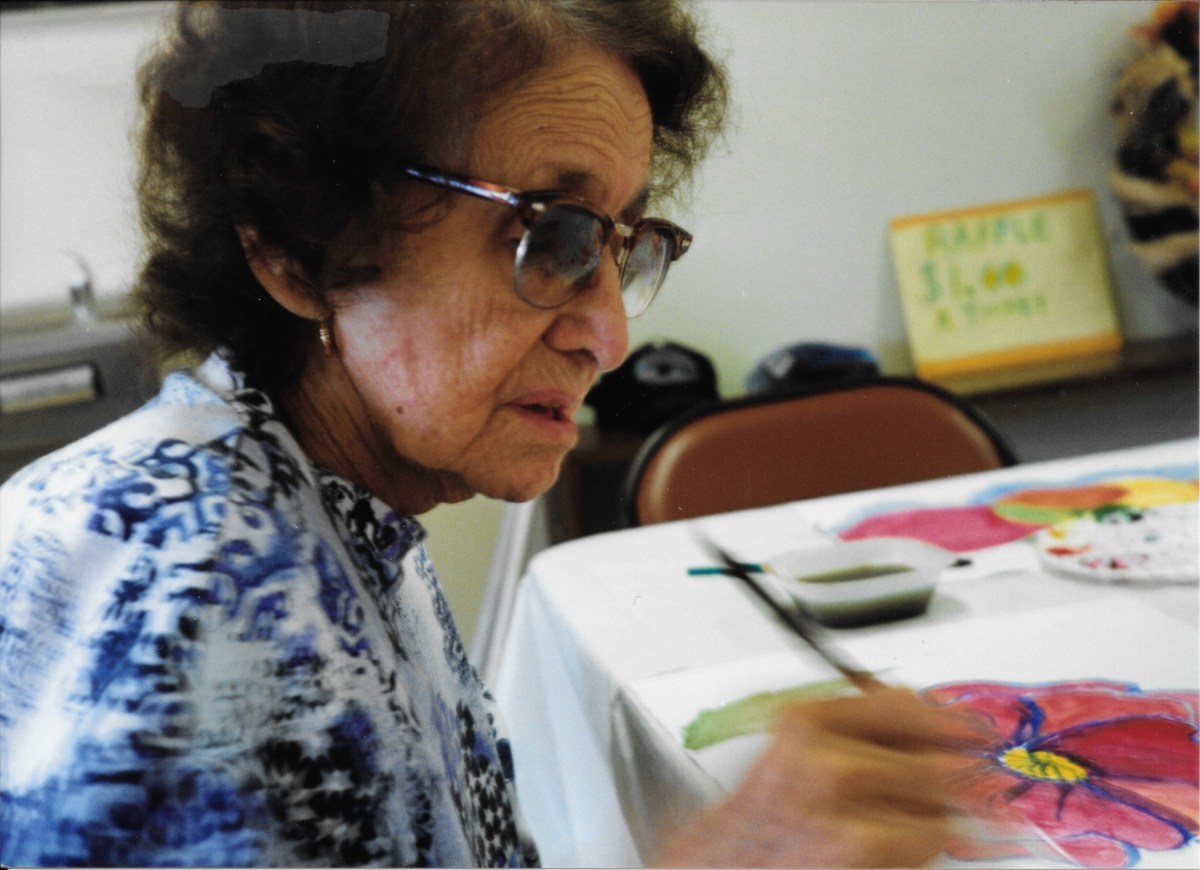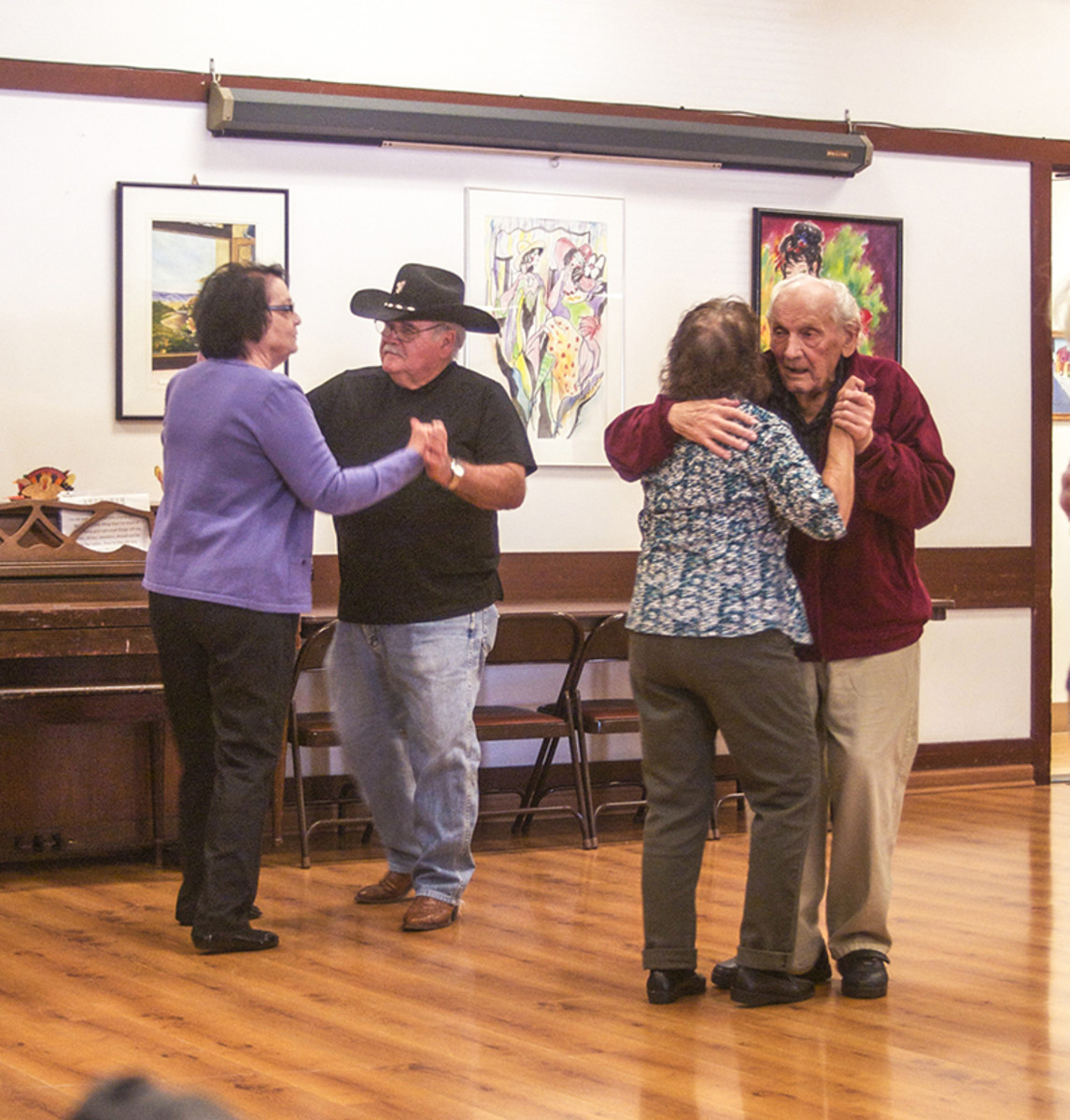Causes of dementia in the elderly
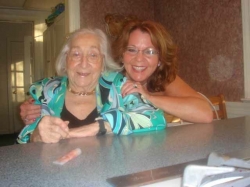
My entry into the world of dementia in the elderly - My story of caregiving for my 94 year old Mom, Gertie
By way of introduction, I am Lori, a 53 year old caregiver for my darling Mom, Gertie. I "married" my Mom on April 7, 2007, the day her partner and lover of 65 years (my Dad, Joe) died. During the past 5 years, I've seen a gradual decline in mental status so that's where my knowledge of dementia in the elderly comes from.
Mom and Dad had lived with me in the summer here in my old farmhouse 14 miles outside DC for the past 15 years so, when Dad died and Mom came home, the transition was fairly easy. She was just coming home to stay this time. We spent a raw year or so dealing with the grief of losing Dad. Well, she actually dealt with it better than I did as I was thrown into the world of caregiving so my mind was consumed with a lot of "WHAT" am I doing moments. I chose not to have children, being a caregiver to 6 dogs instead, so I had a lot to learn about how to keep Mom happy (as much as I could) and healthy. In fact, here's an ebook I wrote about Senior Citizen Caregiving 101: Things I Wish I Had Known.
More can be read about my experiences dealing with Mom in my blog Gertie's Galavants: Tales of a Summer with a 91 (not 94) year old.
DISCLAIMER: I am not a physician so the information in this article is just my own personal thoughts. I have, however, researched the information as I deal with my own Mother's mental decline.
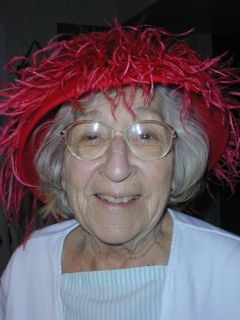
Things were status quo until...
...dementia entered our lives.
For those unfamiliar, "dementia" is a term that means a decline in mental function. Dementia might rear its ugly head with loss of memory, personality changes, or impaired reasoning. Dementia though is not synonymous with Alzheimer's. My Mom doesn't have Alzheimer's (thank you Lord for small favors) which is a much more serious diagnosis.
In my Mom's case, the onset of dementia started rather suddenly and not that long ago. We've been living in this world that I sometimes refer to as "la-la land" for about 6 months now. Initially, I took her to the doctor when I started to notice the changes - everything checked out. She was just, well, aging. The doctor informed me that her symptoms were fairly typical in people who had once been totally vibrant and on top of things. Dementia just happens - sort of like sh*t....
Some good resource books on dementia
I've got a few of these on my Amazon wish list. Any books you can find, or information you can glean, read it. Knowledge is power when competing against dementia (or Alzheimer's).
Some causes of dementia in the elderly
I have learned a lot about causes of dementia in the elderly. If the onset is very sudden, there might be underlying issues that you should have checked out by a doctor, asap. Such causes of confusion in the elderly are listed below and will be discussed in more detail further below.
- Dehydration
- Urinary Tract Infection (UTI). Here's a few articles I wrote about incontinence:
Dealing with incontinence in the elderly
- New environment
- Medications
- Strokes or TIA
- Nutritional deficiencies. Here's a few articles I wrote about keeping the elderly fed:
Healthy eating for senior citizens
- Pneumonia. Pneumonia symptoms in the elderly are a lot different than in a younger person. In fact, pneumonia can easily cause confusion in the elderly.

Dehydration
One of the top causes of dementia or confusion in the elderly
As we age, our bodies might not cue us into its needs as it once did. Dehydration, caused by not drinking enough water, is a likely cause of sudden-onset dementia. The elderly should drink at least 8 glasses of water a day.
One problem you might face though in trying to get an elderly person to drink extra water is the need to urinate at night. I push water on Mom up until about 2 pm and then I lay off. By 2 pm, she usually gets at least 6 glasses into her diet and then will sip more leisurely throughout the afternoon. In this fashion, I've helped her rehydrate and she'll excrete most of the water before bedtime.
This might border on too much information but, if you have an elderly person in your household, you might want to invest in a bedside potty...
And, yes, maybe the photo accompanying this module isn't politically correct but she got the brandy after finishing her water!
Portable commodes on Amazon
We've had a beside commode for my Mom for about 3 years now. It not only gives me peace of mind (I don't have to worry about her walking down the hallway to the bathroom), but the convenience for her makes all the difference in her getting a better night sleep.
I highly recommend this option if you're a caregiver for someone with dementia or decreased mobility.
Here's an article I wrote about portable bedside toilets - Bedside Toilet Chairs.
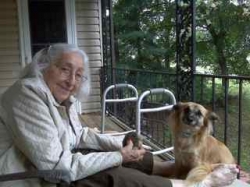
Urinary Tract Infection
A typical cause of dementia in the elderly
Particularly if the dementia or confusion is a quick onset (such as days), get your elderly loved one to a doctor as soon as humanely possible to be checked out for UTI.
UTIs occur as we age, particularly in women, as, well, our plumbing shifts around and it's quite easy to infect ourselves with decreasing bathroom hygiene.
It should be noted that the typical symptoms that accompany a UTi in a younger person (burning on urination, frequent need to urinate, etc) might not appear in the elderly. It's quite possible (and more likely) that an elderly person will report no symptoms of a UTI. It's your job as a caregiver to rule out this cause if dementia or confusion abounds.
You can help your elderly loved one avoid a UTI by 1) asking a doctor for a prophylaxis broad-spectrum antibiotic (such as Bactrim), 2) assisting with bathroom hygiene, or 3) having your elderly friend put on a sanitary pad which is changed throughout the day.
Some people say that cranberry juice, given once a day, will also help with UTIs by changing the pH of the urine. From my younger days, I know this to be true but it works for some women and not necessarily every one. It's worth a try though. Cranberry pills might be another option if your elderly loved one doesn't like the juice.
The photo accompanying this lens is of my Mom and little wee Margarita on our balcony. You can read more about "Rita" in my lens Introducing Golden Margarita - my adopted island girl from St. Croix.
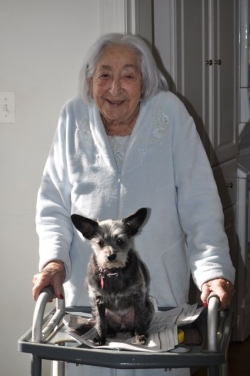
A new environment can easily trigger dementia
Although new surroundings and new routines may delight us while we're young, putting the elderly into new situations can definitely trigger dementia. If you have to move an elderly loved one, take a picture of the room where they spend the most time (ie, the living room) and set up their new surroundings as similar as possibly, down to the photos on the wall. This might help them acclimate to a new environment.
Talk to them about why you're moving them and, after they're moved in, give them a tour of their new surroundings. Make sure to highlight the bathroom facilities. If you're moving a loved one into a nursing home or assisted living, take time to introduce them to a few friendly neighbors.
The photo accompanying this module is of our littlest girl, Gizmo, catching a ride. You can read more about Gizmo by reading my article Gizmo - the dog born to ride.
Tips and Tricks to helping the elderly
I'm always interested in new tips or tricks that my readers may know about caring for the elderly. Please leave me comments.
Do you have a tip or trick to caring for the elderly?
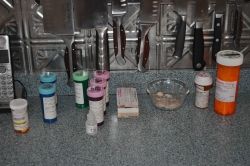
Medications (and their side effects) can cause dementia
if your elderly loved one has a change in medications, and you see an immediate decline in mental function, you've got a pretty good idea of what the cause of the dementia is. Immediately report to the doctor the symptoms and ask if there is a different medication which has less reported adverse events resulting in confusion.
In some cases, medication side effects of confusion may be relieved by adding in another medication to combat the confusion. Sadly, it's a fact of life that most of us, as we age, will have to take medications for something.
Totally off the topic, the photo attached to this module are NOT my Mom's pills! These were all medications for 4 dogs who were going through different problems at the same time. How the heck lucky was I????
These items will help the elderly take their pills on time
I use a large pill container that will hold 7 days worth of pills a day. Each compartment is divided into 4 - breakfast, lunch, dinner, and evening. Since I set up Mom's pills once a week, I have a week's notice when she's running low and can then reorder. With the use of this system, I make sure to give her her pills on time and I never run out.
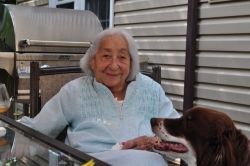
Strokes or TIAs
If you're not familiar with the term, a TIA is a transient ischemic attack, AKA mini-strokes. TIAs may well be a precursor to a full blown stroke if actions are not taken. TIA symptoms include such things as loss of mobility, temporary blindness, daze, headache, and lack of speech. Generally, TIA symptoms may appear for 1-2 hours (although they can be much shorter). TIAs, unlike full strokes, do not cause death to brain tissue but they can be quite disarming.
If you notice any of the above symptoms, call a doctor and report what you're seeing. It's possible that your elderly loved one has a blood clot which can be dealt with before it dislodges and causes a stroke.
More about TIAs can be found here: TIA information.
The photo accompanying this module is of Mom and Killian, her guard dog. I've trained Killian to assist me in my caregiver duties. To date, he "cleans Gert" (gets any crumbs in her lap), picks any item I ask up and gives it to me or Mom, shuttles the TV remote back and forth between us, puts clothes in the washer (his sorting skills suck), and closes the refrigerator door along with other assorted duties. More can be read about this fabulous adopted dog on my lens How to calm down an Australian Shepherd
My and other caregivers Squidoo articles... - ...and a wonderful blog
I hope these articles will give you some ideas or help if you're a caregiver dealing with the elderly.
- Resources for caregivers of aging parents
Some good resources to help you deal with an elderly parent can be found on this Squidoo lens. - Caregiving for the elderly - birdwatching from a lazy boy recliner
I've found that keeping my Mom entertained helps keep the confusion symptoms down just a bit. Here's a lens about how to do just that. - Cooking a low sodium diet
When Mom's dr prescribed a low sodium diet, I was on it! There's some good ideas and recipes here. - A low sodium oven fried chicken recipe
This recipe is very very good and very low in salt. - Senior Citizen Gift Ideas
This lens was put together in the hopes that it will help those struggling to find "just the right gift" for an elderly loved one. - Good gifts for caregivers
How to support your friendly caregiver when times get tough - Caregiver stress syndrome
This excellent lens contains very valuable information about caregiver stress. And, let me tell you, it's right on the money - spoken from a stressed caregiver.... - What's the difference between Alzheimers and Dementia
This lens gives a great overview of the differences between Alzheimer's and dementia. It's a must read for anyone working with the elderly confused. - I feel so unnecessary
This is a blog about Lisa caring for her elderly grandmother. It's misnamed as "I feel so unnecessary" as Lisa is very necessary, as are all caregivers. It's well worth the read and will keep you chuckling. - Changing of the guard blog
This is Margo Arrowsmith's great blog about caring for her elderly dad in the last phase of her life. Her posts are very beautiful and emotional. It's a good read for anyone caring for the elderly.
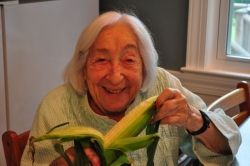
Nutritional deficiencies
Just as getting in enough water a day becomes a chore for the elderly, having them eat a nutritious diet can also become quite a struggle - especially since the things they love the most (ie, corn on the cob, salty pretzels, or beef) may be restricted by a doctor.
Getting the elderly excited about eating takes some imagination and will hone your cooking skills - believe me, I know as Mom was placed on a low sodium diet. I've become quite adept at creating some tasty meals with low salt.
Getting back to my point - if the confusion in the elderly is of a fast onset, have your loved one's doctor run a blood panel and check all of the blood's values. It could be something as simple as adding an iron pill to help relieve some of the symptoms.
Vitamins and/or supplements for the elderly
Here's some good nutritional supplements for the elderly. My Mom has an Ensure meal supplement daily. The Ensure Plus is 350 calories and packed with vitamins and minerals.
As with anything, check with your elderly loved one's doctor before starting him or her on vitamins or supplements.
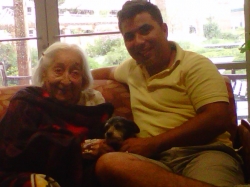
Pneumonia...
...and this illness can be well hidden in the elderly
In the younger population, pneumonia is evidenced by a deep productive cough, perhaps a fever, chills, and difficulty breathing. However, pneumonia in the elderly might be totally asymptomatic, as it was in 94 year old Gert last week.
When Mom first started "losing it" mentally, I took her to her regular doctor who said it was a "normal" part of aging. Well, it might be for some but the doctor didn't delve deeply enough into Mom's case.
Last week, she was fairly unresponsive in the morning - she was sort of alert but much more confused even than previously. A call to 911 and we were off to the hospital and diagnosed with a serious case of right lung aspiration pneumonia. Aspiration pneumonia just means that she had, at some point, aspirated food or drink into her lung - basically, food or drink went down the wrong tube, bacteria grew, and 7 days later, we were released from the hospital and her mind is clear










